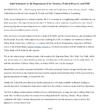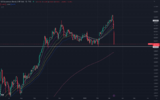There are plenty of moving parts here
and lots of unknowns, most-specifically who's connected to what, where, and with
what reserves?
Apparently the firm attempted to raise capital, failed, and now is looking for a buyer. T
he FDIC stepped in and locked the doors -- they typically do this on a Friday after the market closes but acted early this time.
One
very interesting element of this situation is that the bank,
being a bank, is supposed to have reserves against this type of loss,
especially startup funding which is extraordinarily risky even in the best of times. As I've repeatedly noted one of the big concerns anyone with a brain ought to have is the wildly-distorted market picture you get from a long-term run of negative interest rates in real terms.
I can run a cash furnace, basically, that looks pretty good so long as I can keep financing it at ever-lower interest rates because I can roll over my alleged "debt" (whether I do it formally by redeeming the former debt or informally by issuing more at much lower coupons, thereby diluting the "blended" total rate) on a continual basis.
In
theory these sorts of loans are supposed to be backed by assets
when held by a bank. The question of course is always
what are the assets worth if you need to sell them? The price of a used truck, for example, is
very different if there are no new ones because there are no chips
yet the roofers all need one to haul their stuff to jobs .vs. the converse -- the economy is in a deep recession, there are
fifty new trucks on the local dealer's lot, people are putting blue tarps up instead of reroofing their house when it leaks
and nobody is building new houses.
Reality is that if you hold paper
at a below market rate it is
always discounted to its market value. Why?
Because if you have to sell it that's all you'll get; the buyer would be
stupid to buy your 2% 10 year Treasury
when he can have a new one at 3.94%. Therefore while it is absolutely true that if you hold it for the entire 10 years you'll get your entire $10,000 (for example) back
you will also get the old coupon rate until then instead of the new one. While you can certainly make the claim that
for Treasuries you can hold them to maturity
that claim only holds up if they're not the backing for something else; if they are (e.g. deposits) and someone demands their money
you must sell. Therefore any
logical accounting practice is that
on any rise in rates you may
only count them as "hold to maturity" and thus "money good"
if they are not part of your collateral base for something that can be called -- such as a demand deposit.
To do otherwise -- and I don't care what the Federal Reserve, Congress or FASB claims --
is fraud.
Let's remember that Colonial
claimed in an earnings report that they were fine during the crash --
and about a month later the FDIC came in, closed them, and when BB&T bought the remains they published a valuation which essentially claimed the assets had lost roughly a third of their value over a month's time.
The odds of that being real across an entire portfolio are basically zero, never mind that if you're so-poorly underwriting things that
it is true you're basically running a scam outfit in the first place.
Either way there's no plausible legitimate explanation.
Now we're doing it again,
and at the core of the problem was a known false premise -- rates would never rise and thus the cash furnace game was permanent.
No, it isn't. It never was. It never could be.
Everyone knew it too and that means representing otherwise
was fraud.
So is allowing an institution to mark assets to a model when there is no guarantee that the asset will be worth the modeled price when it matures. There is only
one such asset that meets this criteria and that is a Treasury obligation of some description
which does not back anything that can be called, such as a demand deposit, because if Treasury fails so does the monetary system and government -- and thus the rest is irrelevant.
This specific instance is about a bank
that has a portfolio of assets with very long duration that allegedly "back" its deposits and which were issued at much lower rates than today. If there is a demand for funds
you can't sell them at par because nobody is obligated to buy
and the other alternatives are trading at a higher coupon.
Its even worse in this case than usual because roughly half, from what I can see, is 5+ years out in duration! So if
that paper yields 3%
but the new paper of equivalent quality yields 6%
you have to discount the face to get someone to take it by the difference times the duration.
Anyone who thinks that the very same regulators that should have stomped on this six months ago didn't let other institutions do the same stupid crap has rocks in their head. Said "regulators" were, just as back in 2008, watching Redtube instead of doing their jobs so yeah, there's more to come.
If you remember we were all told back in February of 2008 that Bear Stearns was "fine"; it then failed.
The next lie was that it was contained and not an indication of systemic fraud writ large
among the banking and financial system generally -- the deliberate statement that alleged "assets" are in fact money good. That was a lie.
Indeed the Federal Reserve
knew, as did Citibank, that Lehman was insolvent
weeks before it formally blew up. How do we know this? Because it was documented in the post-mortem; they attempted a tri-party repo with Citibank (the other party being the NY Fed), Citi rejected the collateral as not worth its claimed value
and thus both unsuitable and unstable and Lehman
had nothing else to put up. The attempt failed
and was deliberately concealed from the public as a whole but of course both The Fed and Citi
knew it at that moment in time.
Many people were
shorting Lehman at the time, which looked extraordinarily dangerous
unless you knew they were bankrupt, in which case it was the trade of the century as you knew you couldn't lose. Was it ever run to ground as to exactly who knew, who told who
and that nobody shorting the stock knew -- that is, had material inside information and was trading on it, which is illegal by the way? No.
Is
this incident localized? I have no idea.
But what I'm quite-certain of is that a
lot of financial institutions have loans out
at crazy leverage due to the zero reserve requirements
Ben Bernanke had made available to him via the TARP bill that was eventually passed (
which I reported on at the time) which, in point of fact,
simply accelerated a timeline that had already been there. In other words
Congress had already
planned to give the banks
the ability to do this sort of thing before the 2008 blow-up despite it being ridiculously unsound
and fraudulent. Neither party has done a thing to reverse that in the 15 years since
and you'll note that not one word has been spoken about it in recent years during the Fed Chair's semi-annual testimony either. Every single one of the 535
fraudsters in Washington DC
and every President since Bush has been intimately and
personally responsible for same.
So
is there a ticking bomb -- or three -- out there in the financial system today?
Yes.
There has been for the last 15 years and nobody has been willing to cut the burning fuse.
The fuse is now in the box
and nobody knows how long it is
or how big the explosive is inside.
It might be a very long fuse and a firecracker. Whoopie de-doo-dah.
But given the incentives while the length of the fuse is not necessarily tied to incentives that the explosive is extremely large and might surround a hollow sphere with a pit in the center is in fact rather likely.
Folks We've seen tis (several) times Since the S&L crises, 2K tech blow-up, 2008, yet, here We, are AGAIN..
History repeats & often Rymes..
2008 is calling..
(also the Late 1970's & 1980's)
Remember interest Rates back then?
Credits.. https://market-ticker.org/akcs-www?post=248293
It's (almost) A SHORT the phone book moment..


